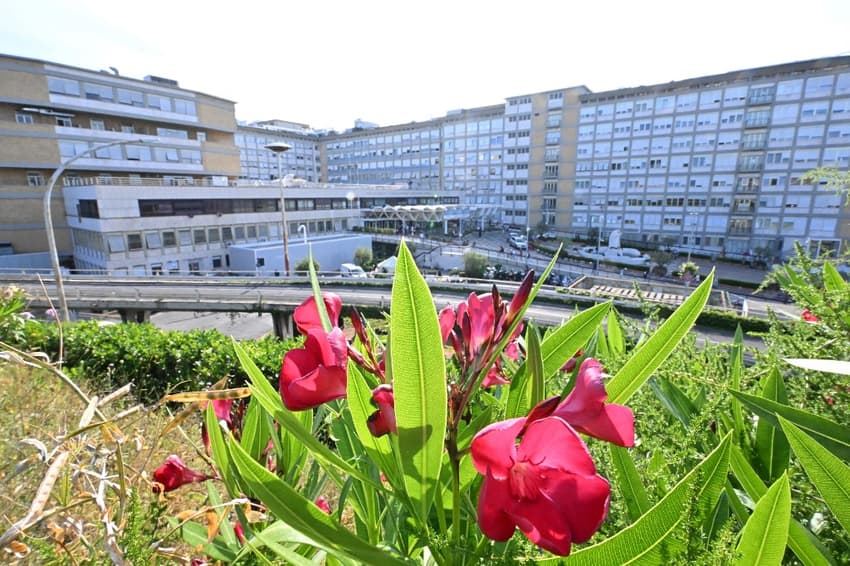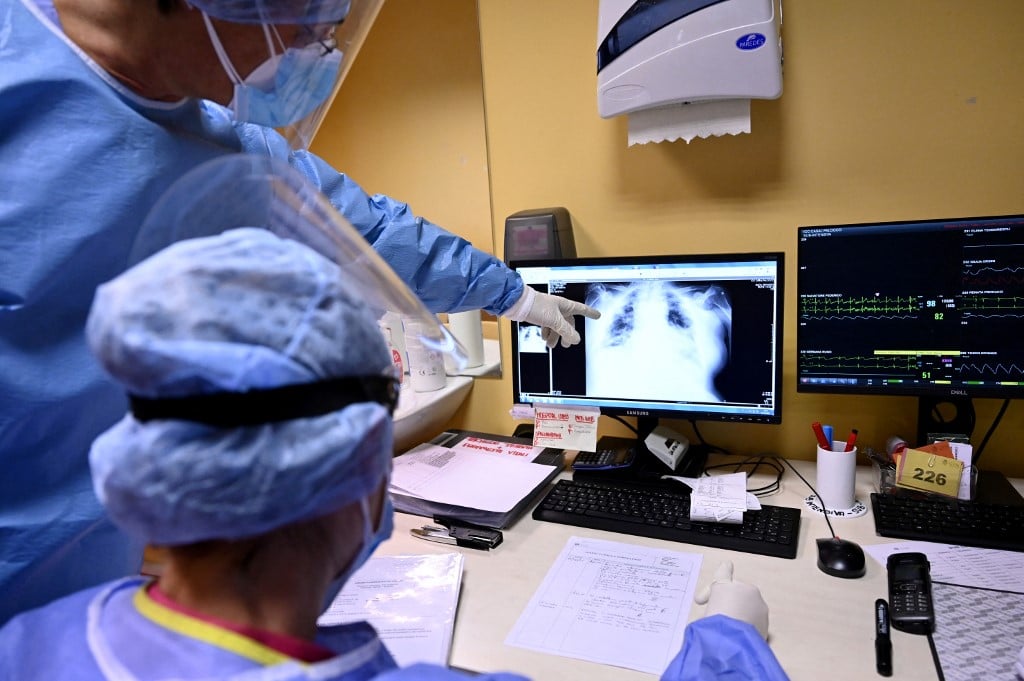'Very professional but underequipped': What readers think of Italy's hospitals

What can you expect during a hospital stay in Italy? We asked The Local’s readers to share their experiences - good and bad.
Italy’s public healthcare system is often said to be among the best in the world. But as with most things in the country, standards vary depending on the region and other factors.
In many areas, particularly in southern regions, health services suffer from chronic underfunding - and Italy's public spending on healthcare overall is below the European average, according to a newly-published study which ranked Italy 16th in the OECD and last in the G7 for healthcare.
Whether or not you personally rate Italy’s healthcare system will also depend on where you come from, and on the type of treatment you need.
But overall, most readers who took part in The Local’s recent survey on the standard of care in Italian hospitals had positive things to say.
In particular, readers praised the expertise of Italian doctors and many were impressed by the medical treatment itself - but also described a general lack of comfort and facilities during their stay.
'World class expertise'
Sarah Balmer, a 74-year-old in Casentino, Tuscany, describes the treatment her husband received at a hospital in Arezzo as "magnificent", noting that doctors spoke English and performed an array of tests over the course of a week before releasing him.
P.L. Bonta in Pistoia also praised the "wonderful surgeon and nursing staff" who carried out his 2018 surgery using the "state of the art" da Vinci Surgical System.
READ ALSO: ‘How I ended up in hospital in Italy – without health insurance’
"Excellent levels of world-class expertise" is how Florence-based 83-year-old Stephen Jenkins characterises the Italian medical system.
However, he adds that communication between staff and patients tends to be "minimal and authoritarian," with the patient viewed as a "subject rather than object of care."
Several readers echoed this point, describing Italy’s healthcare professionals as often lacking in warmth.
"Do not expect any sort of good bedside manner or customer service," says 42-year-old Laura Andersen in Veneto.

(Photo by Alberto PIZZOLI / AFP)
Staff are "very professional in terms of medical treatment, very little bedside manner," agrees Abruzzo-based Michelle Reid, 49.
"Expect to be treated, but don’t expect to be treated like an intelligent person.”
'I wasn't willing to wait'
Patients were divided on whether it was worth paying for private healthcare in Italy, with the majority of those in favour basing their recommendation on the shorter wait times rather than any difference in the standard of care.
“I have had incidences where I have needed scans or MRI, and the waiting time was ridiculous, so I went private to get the results,” says Kenneth Treves in Gualdo di Macerata, in the region of Le Marche.
Jacqueline Gallagher, a 66-year-old in Emilia-Romagna, says she has gone private on occasion "purely because I wasn’t willing to wait for treatment or analysis."
READ ALSO: Public vs private: What are your healthcare options in Italy?
Stephanie Mather, 65, in Umbria comments that it's easier to combine private and public healthcare treatments in Italy than in many other countries as the patient receives results after every test or check-up, allowing them to "discuss the full story with whomever."
"You save time and there are very good private clinics integrated into the system," says 73-year-old Sally Nogara in Venice.
'Underequipped'
Two negative aspects the majority of readers agreed on were the poor standard of food in Italian hospitals, and a general lack of comfort when it comes to facilities.
"Hospital food is never great but here it is completely tasteless and boring," says 60-year-old Grainne in Verona, who adds that she's stayed in four different Italian hospitals.
Michael Trupiano in Le Marche said the food he was served during a three-day hospital stay was "minimal and very institutional,” while P.L. Bonta in Pistoia judged it to be "the blandest food I’d ever eaten."
Linda B., who lives in Piedmont and previously resided in Sicily, observes that a lot of hospitals "don't have soap, toilet paper, even hand sanitizer pumps on the wall were empty."
"Many public toilets are unclean and unequipped - no hot water, toilet paper or hand towels," echoed an anonymous respondent in Tuscany.
Willem-Jan Kuiper in Le Marche also criticised the lack of showers and poorly-equipped washing facilities.
"You need to bring your own towels and cutlery but there are no facilities to wash or hang dry them," he says.
Overall, readers recommended coming equipped to an Italian hospital - both with home comforts and a companion who can advocate for you, particularly if you don't speak Italian.
READ ALSO: Which are Italy’s best hospitals and where are they?
"Make sure you take in your own toilet paper, cutlery, napkin(s), towels and presentable nightwear. Be prepared to describe symptoms, even if complex, verbally and probably in Italian," says Stephanie Mather in Umbria.
"Be your own advocate and take a person along with you that is knowledgeable about your condition and comfortable advocating for you," says Veneto resident Laura Andersen, who also advises patients to "bring lots of your own food and toiletries and pillows and blankets."
Bring your own pyjamas/nightgown,” added our anonymous reader in Tuscany, as well as a "phone charger and long cord."
"Be prepared for your stay and research what you should bring to make it as comfortable as possible," concludes Michael Trupiano in Le Marche.
Comments
See Also
Italy’s public healthcare system is often said to be among the best in the world. But as with most things in the country, standards vary depending on the region and other factors.
In many areas, particularly in southern regions, health services suffer from chronic underfunding - and Italy's public spending on healthcare overall is below the European average, according to a newly-published study which ranked Italy 16th in the OECD and last in the G7 for healthcare.
Whether or not you personally rate Italy’s healthcare system will also depend on where you come from, and on the type of treatment you need.
But overall, most readers who took part in The Local’s recent survey on the standard of care in Italian hospitals had positive things to say.
In particular, readers praised the expertise of Italian doctors and many were impressed by the medical treatment itself - but also described a general lack of comfort and facilities during their stay.
'World class expertise'
Sarah Balmer, a 74-year-old in Casentino, Tuscany, describes the treatment her husband received at a hospital in Arezzo as "magnificent", noting that doctors spoke English and performed an array of tests over the course of a week before releasing him.
P.L. Bonta in Pistoia also praised the "wonderful surgeon and nursing staff" who carried out his 2018 surgery using the "state of the art" da Vinci Surgical System.
READ ALSO: ‘How I ended up in hospital in Italy – without health insurance’
"Excellent levels of world-class expertise" is how Florence-based 83-year-old Stephen Jenkins characterises the Italian medical system.
However, he adds that communication between staff and patients tends to be "minimal and authoritarian," with the patient viewed as a "subject rather than object of care."
Several readers echoed this point, describing Italy’s healthcare professionals as often lacking in warmth.
"Do not expect any sort of good bedside manner or customer service," says 42-year-old Laura Andersen in Veneto.

Staff are "very professional in terms of medical treatment, very little bedside manner," agrees Abruzzo-based Michelle Reid, 49.
"Expect to be treated, but don’t expect to be treated like an intelligent person.”
'I wasn't willing to wait'
Patients were divided on whether it was worth paying for private healthcare in Italy, with the majority of those in favour basing their recommendation on the shorter wait times rather than any difference in the standard of care.
“I have had incidences where I have needed scans or MRI, and the waiting time was ridiculous, so I went private to get the results,” says Kenneth Treves in Gualdo di Macerata, in the region of Le Marche.
Jacqueline Gallagher, a 66-year-old in Emilia-Romagna, says she has gone private on occasion "purely because I wasn’t willing to wait for treatment or analysis."
READ ALSO: Public vs private: What are your healthcare options in Italy?
Stephanie Mather, 65, in Umbria comments that it's easier to combine private and public healthcare treatments in Italy than in many other countries as the patient receives results after every test or check-up, allowing them to "discuss the full story with whomever."
"You save time and there are very good private clinics integrated into the system," says 73-year-old Sally Nogara in Venice.
'Underequipped'
Two negative aspects the majority of readers agreed on were the poor standard of food in Italian hospitals, and a general lack of comfort when it comes to facilities.
"Hospital food is never great but here it is completely tasteless and boring," says 60-year-old Grainne in Verona, who adds that she's stayed in four different Italian hospitals.
Michael Trupiano in Le Marche said the food he was served during a three-day hospital stay was "minimal and very institutional,” while P.L. Bonta in Pistoia judged it to be "the blandest food I’d ever eaten."
Linda B., who lives in Piedmont and previously resided in Sicily, observes that a lot of hospitals "don't have soap, toilet paper, even hand sanitizer pumps on the wall were empty."
"Many public toilets are unclean and unequipped - no hot water, toilet paper or hand towels," echoed an anonymous respondent in Tuscany.
Willem-Jan Kuiper in Le Marche also criticised the lack of showers and poorly-equipped washing facilities.
"You need to bring your own towels and cutlery but there are no facilities to wash or hang dry them," he says.
Overall, readers recommended coming equipped to an Italian hospital - both with home comforts and a companion who can advocate for you, particularly if you don't speak Italian.
READ ALSO: Which are Italy’s best hospitals and where are they?
"Make sure you take in your own toilet paper, cutlery, napkin(s), towels and presentable nightwear. Be prepared to describe symptoms, even if complex, verbally and probably in Italian," says Stephanie Mather in Umbria.
"Be your own advocate and take a person along with you that is knowledgeable about your condition and comfortable advocating for you," says Veneto resident Laura Andersen, who also advises patients to "bring lots of your own food and toiletries and pillows and blankets."
Bring your own pyjamas/nightgown,” added our anonymous reader in Tuscany, as well as a "phone charger and long cord."
"Be prepared for your stay and research what you should bring to make it as comfortable as possible," concludes Michael Trupiano in Le Marche.
Join the conversation in our comments section below. Share your own views and experience and if you have a question or suggestion for our journalists then email us at [email protected].
Please keep comments civil, constructive and on topic – and make sure to read our terms of use before getting involved.
Please log in here to leave a comment.